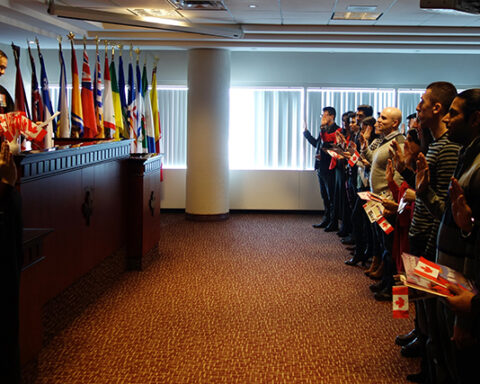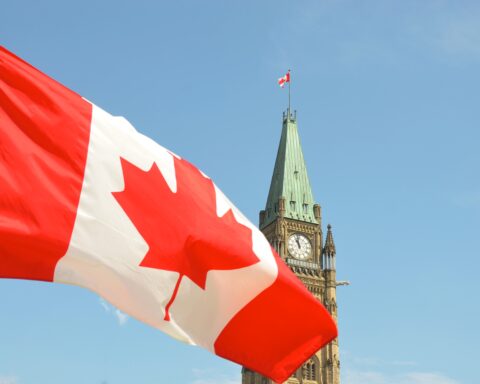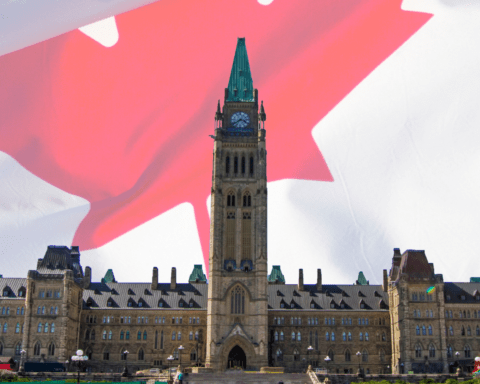Review: The Orenda, by Joseph Boyden, Penguin Canada (Fiction, 2013)
It’s easy to keep track of how long my citizenship study guide has been on my nightstand, because it arrived in the mail, acknowledging receipt of my citizenship application, the same month I gave birth to my son. I naively attempted to study the guide during those bleary early weeks of parenthood — naively because I always ended up falling asleep and because, two and half years later, I have not yet been contacted for my test.
Discover Canada: The Rights and Responsibilities of Citizenship is a bureaucratic document, but that’s not to say it is without imagination. Albeit in bland and simplistic language, the guide articulates a vision of Canada, part historical, part aspirational, which immigrants are expected to embrace — or at least parrot — in order to gain citizenship. One of the ideals most prominently positioned in the guide is that of Canadian multiculturalism, and its emphasis is justified. Indeed, it’s why many immigrants come here. Somewhat interestingly, Canada’s multicultural fabric is described as primarily a consequence of immigration: “over the past 200 years, millions of newcomers have helped to build and defend our way of life.”
This makes a bit of a muddle, however, of the 200 years before that. Canada’s “three founding peoples,” we’re told, are Aboriginal, French, and British,” but “Canadian society today stems largely from the English-speaking and French-speaking Christian civilizations that were brought here from Europe by settlers.” Anyone who has lived in Canada for any length of time knows this to be factually true, and yet framing Aboriginal Canadians as peoples of the past is troubling. If Canada is a multicultural nation, as my guide professes, how do its native peoples contribute to that diversity?
If Canada is a multicultural nation, as my guide professes, how do its native peoples contribute to that diversity?
First contact
For the past few weeks, Joseph Boyden’s novel, The Orenda, has also been in residence on my nightstand. It is a story of “first contact,” the moment in the 17th century when New France was just coalescing, before the crowns of Europe fully understood the wealth of the Americas, and those few Europeans who did set foot in the New World were largely on their own. It is, in a sense, a Canadian origin story, of the time before country, commonwealth, or colony, when aboriginal peoples sensed both the risks and rewards of relationships with the Europeans, if not the speed with which one would outweigh the other.
The novel, Boyden’s third, is narrated in the voices of three main characters. Bird is a prominent warrior among the Wendat people, who lived in much of present-day southern Ontario, particularly near Georgian Bay. Considering his status as a war-maker, Bird’s is a sympathetic and sometimes even tender voice, perhaps because his narrative is addressed to his departed wife, who along with their daughters was murdered by a Haudenosaunee war party years earlier. In revenge, he leads an attack on a small group of Haudenosaunee early in the book, killing several and taking prisoner a young girl whose family is among the dead.
Snow Falls, who is accepted into Bird’s community as his adopted daughter, provides the second narrative voice. She is understandably resentful of her captors, and when she isn’t exacting revenge outright, she’s searching for ways to subvert her adopted father’s plans for her. She often provides stark reminders of the divisions and commonalities between native peoples. “My people are a farming people, just like these Wendat,” she says, early in her captivity. “We are part of this earth. We speak similar tongues and grow the same food and hunt the same game. Yet we’re enemies, bent on destroying one another. I don’t understand it.” Snow Falls’ ferocity is exciting, and keeps the whole novel dimensional, preventing it from becoming a simple power struggle between two masculine points of view, the martial Bird and the proselytizing Christophe Crow.
Crow, our third narrator, is a French Jesuit dispatched from Quebec to make inroads with the Huron peoples farther inland. Bird’s people take him in reluctantly, hoping to cement their budding trading relationship with the Europeans. Crow is well-meaning, but prudish and arrogant, by turns moved by the exotic beauty of the “sauvages” and horrified by what he perceives as their brutality and unabashed sexuality. His clumsy attempts to preach Christianity in the Wendat language are tolerated, but mostly met with a mixture of boredom and laughter. He is such a fish-out-of-water, tumbling down embankments and wobbling canoes, that we, like Bird, are almost convinced of his impotence.
Historical dynamics
These three characters guide us through the evolution of Bird’s community over roughly a decade, as it is transformed from a vibrant village of several hundred to a wandering band of few dozen souls, reduced through several waves of disease, crop failures, and an escalation in warfare with the Haudenosaunee. These pressures coincide with a greater influx of French settlers and European weapons. (The British are mentioned only in passing, but the fact that the story is written in English, which none of the three characters would have spoken, hints at a further wave of upheaval on the horizon.)
These are historical dynamics of which most readers would be aware. But if Boyden’s book is history, it’s history on a human scale, deeply complicated and unnerving. The violence of the book is troubling — some critics have maligned it as too vivid — and the manipulative methods to which the Jesuits resort to win souls are similarly unsavoury. Yet these complications add to the novel’s richness rather than detract from it. Without painting anyone as a villain, Boyden is able to suggest to the reader how deeply strange Aboriginals and Europeans must have been to one another — and perhaps continue to be. And yet, they are able to approach a fragile interdependence, too fragile, unfortunately, to survive the greater forces at work.
Released last September, Boyden’s bookhas been shortlisted for numerous national literary awards, and this spring it won CBC’s 2014 Canada Reads contest, which sought to name “a novel to change our nation.” I would agree with the assertion, made as part of that contest, that reconciliation with Canada’s native peoples is long overdue and among the greatest social justice issues of our time.
It is a novel that asks us to find our future in our origins.
If we envision Canada as a truly multicultural society, where the historical and current contributions of all groups are honoured, we ought to be equally aware of all three of our founding peoples. The Orenda seems like a good place to start in developing that awareness. It is a novel that asks us to find our future in our origins. Likeness is attractively easy and comfortable, but in the end, in a multicultural society we are bound together by something more complex: the shared effort to find common ground where none may be readily apparent and (to borrow a phrase from my citizenship study guide) forge “unity from diversity.”
This is what Boyden’s characters struggle to do and likely what many Aboriginals and Europeans did in the early days of their encounter. Boyden has picked up a thread of Canadian history that was dropped, one that might be key to holding our multicultural fabric together.




